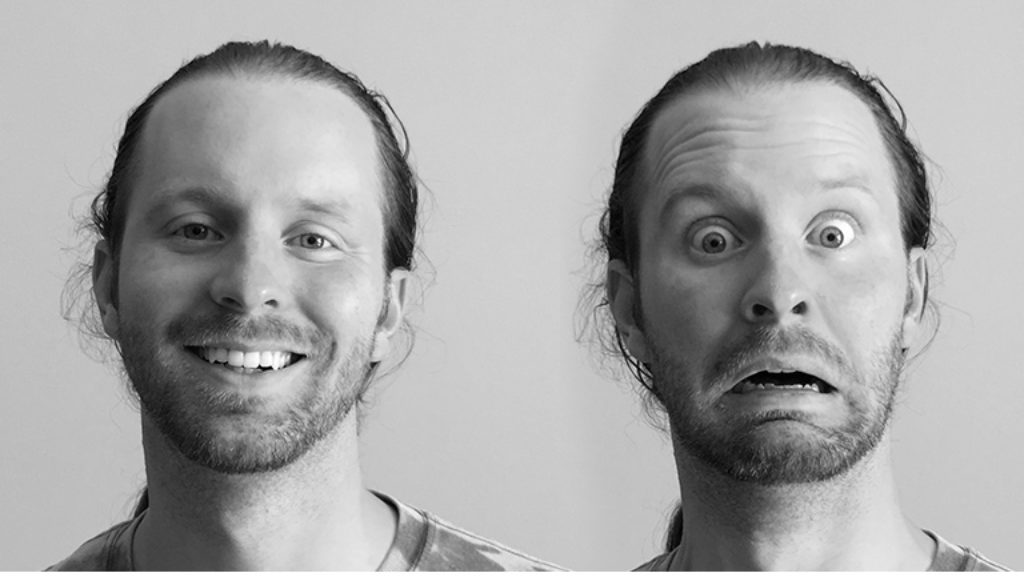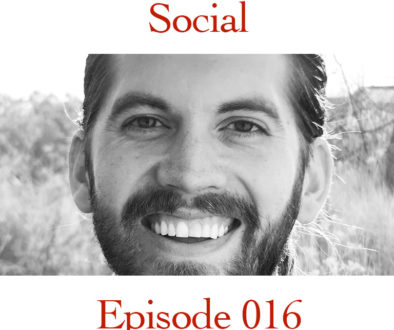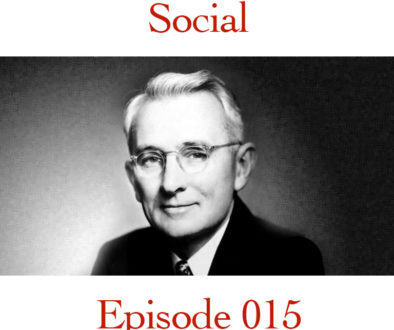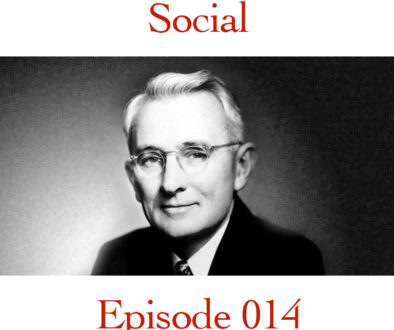Ep 002: Our thoughts attract what we love & fear
Show notes
“How you do anything is how you do everything” -T. Harv Eker
“All Human behavior is a result of the state we are in.” -Tony Robbins
Transcription:
Josh: Hello and welcome back to Social: the power of relationships podcast…Today we are going to jump into chapter one of the book that we mentioned last week, Social: the Power of Relationships. First off, we wanted to start with a quote from the first chapter.
Jason: This quote is normally attributed to T. Harv Eker: How you do one thing is how you do everything.
Jason: This relates to relationships because how you handle one relationship is how you will ultimately handle all the other relationships in your life.
Josh: We develop patterns for how we interact in our world, and they become habits. We develop them from a very early age. From the time we’re young children we learn how to process all the information that comes in and our parents and those around us teach us what’s good or what’s bad and then we interpret those things moving forward as good or bad. And sometimes they are flawed and we gain a flawed perspective. But it becomes the foundation for how we see the world moving forward.
Jason: So today we are going to talk about building a relationship with yourself. And how important it is to understand how you treat yourself is not only how you’re going to treat other people, but how other people are going to treat you.
Josh: Right. We develop a relationship with ourselves from an early age, too. And sometimes, as I said, that can be really flawed. I like that this is the first chapter because it is kind of at the root of some of our relationship problems in the world. We gain a really flawed sense of who we are, and how we should view ourselves. We don’t want to be proud or for whatever reason we tend to criticize ourselves more and put ourselves down more.
Jason: So how do you develop a personal relationship with yourself?
Josh: I think that being thoughtful about it in the first place is important. I didn’t think about it for most of my life. I didn’t think that I needed to make choices about how I see myself. I would just return to the habits that I had developed as a kid. And mine were pretty poor, they were pretty negative. So I would see myself through a negative lens. I would say “you made a mistake there, therefore your value is lessened. You have less value as a person. Therefore you deserve less happiness”. And I think that we all kind of have this negative self-talk. It got to the point where I had to be thoughtful about that, be purposeful about that and say whether that’s true or not, I don’t want to believe those things, I don’t want to feel that way. I would like to believe more empowering things about myself. I would like to find more happiness and more peace. I had to become aware that I was creating the lens. That the way I was feeling was going to be created by how I see myself. And so I had to make different choices. And it’s tricky because like I said they’re habits. And so you have to be very aware and kind of conscious all the time and say why am I feeling that way, oh it’s because I’m thinking this negative thing about myself.
Jason: And where did that trigger happen? Where did it all begin?
Josh: Right.
Jason: For me, I like to think of my older brother. He was a great example for me. He was the first person that really got me thinking about the relationship I have with myself. He was telling me why he made his bed in the morning. So every morning he would wake up, make his bed, and change his clothes, and he would always fold up his pj’s and put them on the bed. And when he would come home at night, he would look at the bed and he would go “oh thank you Past Self for making the bed and putting my pj’s there nicely so I can get ready for bed at night”.
Josh: So that leads into one of the main points of this chapter, that you talk about three versions of yourself.
Jason: That’s right. There’s the past self, the present self, and the future self. And when we talk about ourselves, we talk about ourselves in those three categories. Like “I’m going to worry about this later…”
Josh: I’m going to worry about this later. Isn’t that a weird phrase that we say to ourselves? We’re literally telling ourselves not just that we’re going to think about this later, but we’re going to worry about this later. Why would we choose to worry at any point? But we do. And our words are very specific and they’re powerful. So then what do we do? We do worry about it later.
Jason: That’s true. I had a big breaking point with the relationship I had with myself. I was in college and life was very busy and I would be very lazy about making my bed, and doing my dishes, cleaning up after myself. And I came home one day and the apartment was a mess and I kind of woke up to how messy it was and I was angry at my roommates because nothing was clean and I barged into my roommate’s room to find that it was empty. And at that point found out that my roommate had moved out months ago, and the person who was messing up the apartment was me. I was the one leaving the clothes everywhere and leaving the dishes in the sink and leaving basically a trail of broken promises to myself because I would always say I’ll do this later and when later comes I was so depressed that my past self didn’t get it done that I didn’t feel like doing it now so I would go do something else like go hang out with a friend or play a video game.
Josh: I see the relationship with myself in terms of the emotional state. This is kind of a concept that I stumbled across over the last few years. Tony Robbins says that all human behavior is the result of the state that we are in, in the moment, in any specific time. But what I think we don’t always realize is that we have a great control over our states. And so we just let them happen to us. We aren’t intentional about creating a different state for ourselves. I’ll worry about it later…I think that sometimes there’s a reason why we don’t want to do it now, and that’s okay.
Jason: Normally it’s because we’re tired. We’ve been working all day, or someone else has passed on their garbage to us, and we feel miserable because they felt miserable around us and because of that we don’t do the other things in our life that show ourselves compassion and show ourselves love.
Josh: So we don’t process the problems that are there presently with us. And thereby make our future self happier or more grateful.
Jason: When you’re in that, where do you start? Where do you begin to make the change? Normally for me I begin by listing things I’m grateful for. Grateful for myself and grateful for the moment, grateful for what I’m capable of doing now.
Josh: Great! Gratitude is one of the highest frequencies we have. Love and gratitude. And when we can get into a state of gratitude, it changes our entire perspective.
Jason: It does. And gratitude is the starting point. If you’re trying to change the way you feel, gratitude is always the beginning. You have to start looking for something you’re grateful for. And as you’re building your gratitude, then other emotions start to take place. Like you start to feel joy that you realize that someone has washed the dishes for you. Or you start to feel love for others or yourself. All these other emotions come, but they come after you position yourself in a sense of gratitude.
Josh: Gratitude for yourself
Jason: Yes, for yourself. That is where you want to start.
Josh: What about for those people who struggle to feel gratitude or to feel positive? I’m speaking from personal experience because I’ve dealt with anxiety and depression for most of my life pretty intensely. There have been times I’ve been able to get myself to gratitude and think yeah that feels really good, but a lot of the time I have just really struggled to get there. Do you have any advice for someone who hears this and almost just rolls their eyes and thinks okay here’s another gratitude guy telling me to be grateful and just count my blessings. Is there a way that you’re found that pretty consistently gets you into a good state?
Jason: There’s a couple of different things. You can go exercise. Sending those endorphins into your body can really help you. Setting goals. When I was 14 I was really struggling with depression and there was a psychologist that I met with and these are things that they suggested to me. But something that has helped me more than anything was actually looking for opportunities to help other people. To serve other people. A lot of the time that ended up being washing dishes for my mom. And that’s the last thing on our mind that we want to do. But that for me has been the biggest tipping point of moving myself out of a depressed state into something more positive. In that moment you have to put aside all your worries, all your fears. You have to put aside all the things you don’t like about yourself. And stop thinking about them so you can start thinking about ways to help someone else in your life. Whether that be a roommate or a spouse or a sibling. Or even a co-worker. You have to start thinking okay what are they going through? What would impact their life to make their life a little bit better? And then going about taking those actions to do that, your thought processes have to change completely. From that moment you’re forgetting your fears and the reason that you’re depressed in the first place. And you start to feel love for the person that you are trying to help or trying to serve. And that tends to linger longer afterwards and those sad and depressed feelings may return later, but the more I serve, the longer it takes for those feelings to come back.
Josh: That’s wonderful. I’ve found that the emotional state and the reason that we do something is the most important factor. There have been times in my life where I’ve tried to serve, as you say, but I’ve done it with the motivation of fear or shame. Like you have to do this or you’re bad, or you have to do this to avoid being bad. And so I think that for me one thing that has helped a great deal is being very patient with myself and being very honest with myself, allowing myself to feel bad and allowing myself to feel bad and being very compassionate with myself. And saying there’s a reason that I feel bad. And Brene Brown says we should talk to ourselves the way that we would talk to someone we love. So talk to yourself that way. If someone you really really loved was sad or depressed, how would you talk to them? Would say that doesn’t matter, how you feel doesn’t matter? No we wouldn’t. We would be empathetic. Even just sitting with them and allowing them to feel validated. I think that that helps us as well. If we can learn how to develop that skill with ourselves, and to validate our own feelings and say why do you feel bad? And let yourself talk. And listen to yourself.
Jason: You got it spot on! That is a great example. That reminds me of some things I’ve done in the past when I had a negative emotion that doesn’t go away. No matter if I’ve gone out and helped someone. I might be laying in my bed and be completely overwhelmed and depressed, and I’ll pull out my journal and I’ll answer three questions. Why do I feel this way? How can I fix this or accept it the way it is? And what makes me happy? And with the second question I always commit to doing something to change it if I can. But if there isn’t anything I can do it’s about accepting it the way it is.
Josh: And allowing yourself to be enough just as you are.
Jason: That’s right.
Josh: Well, thank you again. This was a quick jump into this chapter. Go to the website. It’s gatewaygears.com and you can find the book and purchase the book.
Jason: And also if you want to find more episodes you can also go to socialthepowerofrelationships.com




